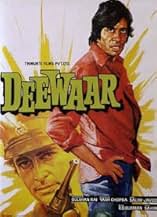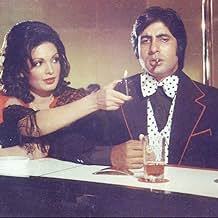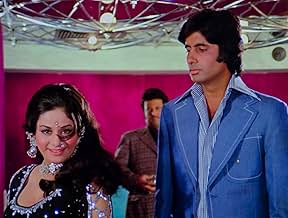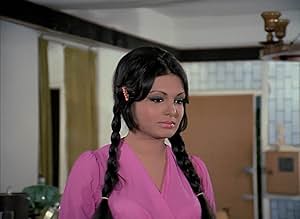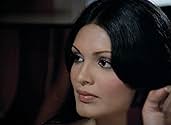अपने अतीत के कारण विजय, अपराध की तरफ़ चला जाता है, जबकि उसका छोटा भाई रवि, एक ईमानदार पुलिस अधिकारी बन जाता है. लेकिन भाग्य उन्हें एक दूसरे के खिलाफ़ तब खड़ा करती है जब रवि को विजय को पकड़ने... सभी पढ़ेंअपने अतीत के कारण विजय, अपराध की तरफ़ चला जाता है, जबकि उसका छोटा भाई रवि, एक ईमानदार पुलिस अधिकारी बन जाता है. लेकिन भाग्य उन्हें एक दूसरे के खिलाफ़ तब खड़ा करती है जब रवि को विजय को पकड़ने के लिए भेजा जाता है.अपने अतीत के कारण विजय, अपराध की तरफ़ चला जाता है, जबकि उसका छोटा भाई रवि, एक ईमानदार पुलिस अधिकारी बन जाता है. लेकिन भाग्य उन्हें एक दूसरे के खिलाफ़ तब खड़ा करती है जब रवि को विजय को पकड़ने के लिए भेजा जाता है.
- पुरस्कार
- 7 जीत और कुल 2 नामांकन
- Samant
- (as Madanpuri)
- Mulk Raj Daavar
- (as Iftikhar)
- Anand Verma - Father
- (as Satyendra Kapoo)
- Young Vijay Verma
- (as Master Alankar)
- Young Ravi Verma
- (as Master Raju)
फ़ीचर्ड समीक्षाएं
I have seen Deewar a dozen times maybe, but never in that sense of reviewing patterns-the one-take viewing, I mean. Recently, I had a chance to watch it at the 80 Years Celebration of Big B at PVR, and I knew that this was the right time and the right kind of experience that could help me review this film. However, I had to leave the screening halfway, but I had decided that I would complete it at home on one fine Sunday. Today was the day. I won't talk about the story, the acting, or other mainstream review aspects because you all know the story, the performances, and almost everything about Deewar by now. What different things can I add? Nothing. Let's just celebrate those moments instead.
Deewar may have a different impact on every viewer, but let me elaborate on my views, and I hope most of them will match yours. So, Deewar came out in the same year as Sholay, which made it lose a huge fanbase amongst B and C mass audiences. Sholay, of course, deserved it, but Deewar definitely deserves more than what it got. It was not the internet era, or else it might have spread like a fire. Anyways, I look at Deewar as the wall that stood between critical and commercial cinema that also had a social conscience. Hollywood had the universally acclaimed "The Godfather" in the same decade, but tell me, did that film ever teach you anything about goodness or spiritual penance? Yes, we know that the hero is wrong, but how many of you actually hate him or want him dead? What does his death teach you? Nothing. Here, Deewar does it.
James Cagney played a similar maa-ka-laadla criminal in White Heat (1949) and died remembering his mother. Amitabh Bachchan may have similarities with that character, but the other aspects of Deewar-i.e., Shashi Kapoor being a cop, the villain played by Madan Puri, Nirupa Roy's never-at-wrong mother, and the socio-political changes our nation was going through then-were not copied from any Hollywood film. Deewar is so original and utterly influential there. The entire 70s decade was about mainstream commercial films taking over the box office. While Amitabh Bachchan, Dharmendra, Rajesh Khanna, and Manoj Kumar were busy doing their kinds of commercial cinema, some maverick brains like Shyam Bengal, Satyajit Ray, and Mrinal Sen were busy making "new wave cinema." So it wasn't like we were investing just in "money spinners." The audience did have a choice, but it had a low appeal, which is very natural not just in India but in any corner of the world. Deewar somewhat broke that wall between socially powerful cinema and commercial potboilers.
Manoj Kumar had started doing it much earlier, and even Dev Anand had his own ideology in the 60s, but the 70s were the perfect time for a film like Deewar. Salim-Javed's iconic pair delivered an iconic piece of writing that will be remembered for years, even after their departure and that of other team members. How many memorable scenes and dialogues we have-one just cannot count them all. That iconic Mera Baap Chor Hai, Vijay's self-respecting attitude while taking money for boot polishing, Ravi's hunger while standing on the school's gate and Vijay and his mother watching him from underneath the bridge, the next moment he decides to give up his education and dreams for his brother's future, and you know their ideologies are going to collide in the future, the temple scene when Priest tells Sumitra Devi not to force religious faith on Vijay, and somewhere, you know he's going to come here someday in future, then Vijay's iconic blue shirt look as a porter, his fight against the goons that iconic dialogue on Keys and Waiting, soon her gets big buddy and yet does not forget to tell the boss that "Me Aaj bhi feke hue paise nahi uthata," and soon after he gets rich, Ravi becomes a Police (such a fantastic line-up of events), and so many more in the second half. Deewar is not just a film but a textbook on pure red Hindi cinema with a true blue mass hero. This just doesn't get better than this. You may have to look for 10,000 or more classics all over the globe, and still you won't find a mixture like this.
Hollywood shifted to the new wave of cinema after the late 50s - this was the end of the Golden Age for them - because they knew they had established almost every genre, theme, sub-genre, and concept that anyone could have had 50 years later. They shifted for the race of the 21st century, but Indian cinema was still digging for contemporary classics, at least with big films. Thankfully, we had major classics being made after a certain small gap of 1 or 2 years continuously, but a classic that could be remembered for decades needed to come more often. We missed that in the 60s, but the 70s gave us hope. Actually, the 70s decade fulfilled that dream for us, where we got the cinema that audiences wanted to see and wanted to take forward for the next generation. Deewar was one such film.
Amitabh Bachchan's rise was not just about megastardom; it was about the legacy of an actor too. Babi says, yaha tum se jyada handsome koi nahi tha." I was like, she is saying the exact thing. How handsome he looked in that suit, with his hair over his ears and big collar attire! Shashi Kapoor's filmography may have many other great films, but the shortest dialogue he ever uttered, "Mere paas Maa Hai," would always be on the cover page. I don't care what world cinema had, but I know that they didn't have an actress to play a mother's role like Nirupa Roy did. "Tu itna Amir nahi hua ki apni Maa ko kharid sake". If you didn't clap here, slap yourself now. Billa No. 786 has been used in many films, but never like Deewar. The usual romance between Neetu Kapoor and Shashi Kapoor was as sweet as Rasgulla, while Parveen Babi played a girl from the lost era of Hollywood (the 40s). Deewar may not have the same box office numbers as Sholay (sorry for repeating this sentence), but I am sure it must be setting a fire (pardon the quick translation for Sholay) in the hearts of true movie buffs. If the entire decade has to be defined to someone who asks about the changing phase of cinema along with audiences, then show him our "Wall of Fame," where "Deewar" is hooked forever.
RATING - 8/10*
Mr. Bachchan has left his mark over the years in a number of movies, and this was an early one that his loyalists remember. Seeing it today and realising that he was still in the early stages of his career makes one wonder how he could have got even better since this movie.
Not many movies can claim this effect on its audience after such a long period of time, including several with Mr. Bachchan in the lead.
Story wise it's normal, but its screenplay & dialogues by Salim-Javed and how the actors delivered them are amazing. Specially Big B nailed his character, what swag and attitude the character needed he portrayed it perfectly. It's one of the three Hindi films featured in the book '1001 Movies You Must See Before You Die.' One of the most iconic films in Indian Cinema.
Available on ZEE5.
© MandalBros.
Go rent Deewaar.
Every once in several decades comes a movie that breaks all the norms and still manages to become not only a runaway success but also an established classic. Deewaar is one such movie. Thirty years after its release, Deewaar remains one of the most famous movies Bollywood has ever produced. Those who love Hindi cinema for its extravagant song and dance routines, its mix of romance, comedy, action and melodrama, and its over-the-top emoting may be surprised to learn that this 1975 explosion-of-a-movie is conspicuously devoid of such characteristic elements. Yet Deewaar is certainly a mainstream Bollywood film. It just happens to be a phenomenal one.
Deewaar begins with a terrible choice: in order to save his family's lives, Anand Verma (Satyen Kappu), the union leader of the local mine workers, betrays his constituency, surrendering to the mine-owners' extortionate demands. In return, he is humiliated and ostracized by his community. Unable to bear the shame, Anand absconds, leaving his wife, Sumitra Devi (Nirupa Roy), and his two sons, Vijay (Master Alankar, Amitabh Bachchan) and Ravi (Master Raju, Shashi Kapoor), to fend for themselves.
Ravi, the youngest child, largely escapes the backlash, sheltered from the community by his mother and brother. Vijay, on the other hand, bears the brunt of the trauma; he becomes the target of brutal public humiliation. The consequences of Vijay and Ravi's very different experiences only intensify as the brothers grow up. In a desperate bid to give his mother the material comforts he thinks are her due, Vijay takes to a life of crime. In contrast, Ravi, disgusted by repeated rejections in a job market powered by nepotism, decides to enroll in the police force. Inevitably, the siblings' differing ideologies lead to an epic moral clash that creates a "deewaar," or wall, between them. This wall becomes insurmountable when Vijay's mother refuses to accept his ill-gotten riches, and forsakes him to live with Ravi. Ultimately, Vijay's misery compels him to seek redemption, but his attempt to obliterate the wall dividing his family will exact an unthinkable price.
Deewaar is, in one word, taut. From start to end, the movie is unrelentingly tense, tight, somber and serious but the seriousness of the film works for two vital reasons: the absolutely amazing, scorching and explosive under-acting by Amitabh Bachchan; and the screenplay and dialogs by Salim-Javed.
To say that Amitabh has acted really well in Deewaar is like saying Niagara Falls is a really big waterfall: it misses the enormity of the fact by several million gallons. To lovers of true cinematic acting (and yes, there are some such fans even in Bollywood), Deewaar offers a true, unadulterated, powerhouse performance unparalleled in Hindi cinema. There is no living (or dead, for that matter) actor who could have performed some of Deewaar's most muted and yet powerfully moving scenes -- scenes in which Vijay's silent anguish abruptly transmutes to violent eruptions, literally burning up the screen with intensity, anger, brutality, vulnerability and gritty resolve. To the small but fiercely loyal group of Amitabh fans, Deewaar is and will always be his best performance. To some of us, it defines the gold standard in Hindi film acting. It is Amitabh and only Amitabh who turned this movie from a typical over-the-top melodrama with great dialogs but no good songs into a gripping three-hour experience that leaves the audience mesmerized (and in an overwhelming majority of cases, crying uncontrollably as the end credits roll).
As for Salim-Javed...apart from developing what is arguably the tightest script ever written for Hindi film, the pair should have gotten an award for the sheer number of quotable lines in Deewaar. Salim-Javed's script was also daring detour from the mainstream in more ways than one. Consider the oddities. The leading man has no songs in the movie. There is absolutely no comedy - no Johnny Lever or Asrani anywhere in sight. Meanwhile, the leading lady (played convincingly by Parveen Babi) is a hooker, who -- as the narrative explicitly insists -- has sexual relations with the hero. True, both characters' occupations entailed a set of moral values that are less-than-perfect by Indian middle-class standards, but the screenwriters still took an enormous risk by depicting some pretty bold scenes . Yet the power of the script was such that in the end, audiences were rooting for both characters with great sympathy and support. Finally, the leading man is an atheist (albeit superstitious). Not only that, one of the now-famous temple scenes has Amitabh clearly defiant and contemptuous towards God. Quite an audacious step, considering modern heroes are always shown to be terribly pious and god-fearing.
Finally, the most significant evidence of Deewaar's superiority is the fact that unlike other hit movies like Sholay and more recent ones like DDLJ, no one has ever dared to copy it. It is the one film whose magic other film-makers realized could not be duplicated. The confluence of extraordinary acting and a uniquely brilliant script cannot be converted into a formula and regenerated ad nauseum. In the end, that may be the biggest tribute Hindi cinema can pay to this all-time, genuinely inimitable classic.
Where Chopra scores the most is in the portrayal of the relationships which is done in a most realistic and matter-of-fact way even within the limitations of commercial film. The relationship between Bachchan and Parveen Babi is amazingly authentic and believable, and so is Shashi Kapoor's with Neetu Singh. The ideological differences between the brothers is given utmost importance obviously, and it's done well. Needless to say, Bachchan gets a role he became most associated with, and he is remarkably real. He creates a stylish, restrained persona but adds a great deal of depth and layering to it. Shashi Kapoor supports exceedingly well, with their scenes together highlighted well, and Nirupa Roy is a good driving force. The ladies, Babi and Singh, are natural, and Babi in particular presents a moving act. Deewar is an interesting moral commentary.
क्या आपको पता है
- ट्रिवियाAmitabh Bachchan had become extremely popular after the success of Zanjeer (1973) and Majboor (1974), hence there was immense craze for Deewar. The fans had lined up from Marine Drive till Minerva (Mumbai) at the premiere of the film. The sheer frenzy surrounding the movie completely caught everyone off guard as no one had ever foreseen this kind of mob hysteria.
- गूफ़In the awards scene at the start, Nirupa Roy is shown again in the audience after she goes on the stage.
- भाव
Vijay: Your principles, your ideals? What work are your principles of? What work are your ideals of? All your principles mashed up together couldn't make up one time of bread Ravi ! The ideals for which you are ready to play from your life, what has they given you? One rented quarter, a rundown police car, two pairs of brown uniform. Watch, watch today this is all me, today this is all you, we both have stood up together from this pathway, but today where have you remained and where have I arrived. Today I have a bungalow, car, bank balance. What do you have?
Ravi: I have mother.
- कनेक्शनFeatured in Bollywood Bound (2002)
- साउंडट्रैकKehdoon Tumhen
Written by Sahir Ludhianvi
Music by Rahul Dev Burman
Performed by Kishore Kumar and Asha Bhosle
टॉप पसंद
- How long is Deewaar?Alexa द्वारा संचालित
विवरण
बॉक्स ऑफ़िस
- दुनिया भर में सकल
- $65,317
- चलने की अवधि2 घंटे 54 मिनट
- ध्वनि मिश्रण
- पक्ष अनुपात
- 1.37 : 1
इस पेज में योगदान दें



